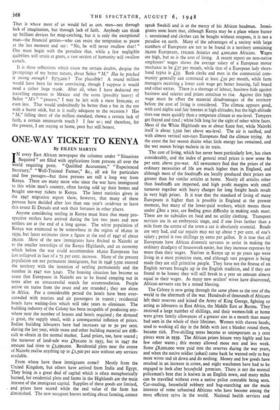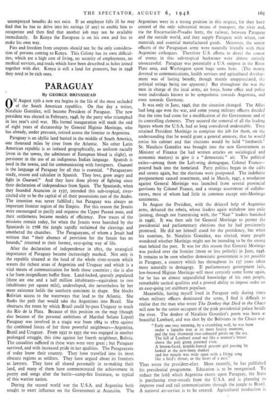ONE-WAY TICKET TO KENYA
By EILEEN MARTIN
N every East African newspaper the columns under " Situations I Required " are filled with applications from persons all over the world requiring posts. " Qualified Accountant," " Experienced Secretary," " Well-Trained Farmer," &c., all ask for particulars and free passages—but these persons are still a long way from Kenya. There are many more who since the war have immigrated to this white man's country, often having sold up their homes and bought one-way tickets to Kenya. The latest statistics given in the 1947 migration report show, however, that many of these persons have decided after less than one year's residence to leave this ersatz El Dorado and seek their fortunes in other places.
Anyone considering settling in Kenya must learn that many pro- spective settlers have arrived during the last two years and new settlers are at the end of a long queue. The white population of Kenya was estimated to be somewhere in the region of 16,000 in 1939, but latest estimates show a figure at the end of 1947 of about 29,000. Most of the new immigrants have flocked to Nairobi or to the smaller townships of the Kenya Highlands, and an economy which before the war could accommodate i6,000 Europeans has just collapsed in face of a 75 per cent. increase. Many of the present population are not permanent immigrants, but in 1946 3,500 entered the territory with the intention of settling permanently and the number in 1947 was 5,040. The housing situation has become so acute that Europeans in Nairobi are to be found camping out in tents after an unsuccessful search for accommodation. People arrive on trains from the coast and are stranded ; they are alone in Africa. For a considerable period the hotels have been over- crowded with tourists and air passengers in transit ; residential hotels have waiting-lists which will take years to eliminate. The building industry of the Colony has been incapable of producing any- where ..near the number of houses and hotels required ; the demand is great, the supply small, with a consequential inflation of prices. Indian building labourers have had increases up to 5o per cent. during the last year, while stone and other building material are diffi- cult to obtain in the normal market. Land prices, too, have soared ; the turnover of land-sale was £850,000 in 1935, but in 1947 the amount had risen to L3,290,00o. Residential plots near the centre of Nairobi realise anything up to ki,5oo per acre without any services available.
From where have these immigrants come? Mostly from the United Kingdom, but others have arrived from India and Egypt. They bring in a great deal of capital which is often metaphorically burned, for residential plots and farms in the Highlands are the main interest of the immigrant capital. Supplies of these goods are limited, . and prices have soared while the real value of the farm has diminished. The new occupant knows nothing about farming, cannot speak Swahili and is at the mercy of his African headman. Immi- grants soon learn that, although Kenya may be a place where butter is unrationed and clothes can be bought without coupons, it is not a paradise on earth. Many of the advantages of a society with large numbers of Europeans are not to be found in a territory containing 29,000 Europeans, ito,000 Asiatics and 4,000,000 Africans. Wages are high, but so is the cost of living. A recent report on non-native employees' wages shows the average salary of a European motor mechanic to be £37 per month, while that of a European lady short- hand typist is £33. Bank clerks and men in the commercial com- munity generally can command at least ‘50 per month, while farm managers receiving a lower cash wage get better housing, full board and other extras. There is a shortage of labour, business bids against business and salaries and prices continue to rise. Against this high wage must be offset the material disadvantages of the territory before the cost of living is considered. The climate appears good, with cool nights and fair breezes at high altitudes, but the high altitude tires one more quickly than a temperate climate at sea-level. Tempers get frayed and tired ; white folk long for the sight of other white faces. Most of the White Highlands are at about 8,000 feet, while Nairobi itself is about 5,500 feet above sea-level. The air is rarified, and with almost vertical sun-rays Europeans find the climate trying. At the coast the hot season drains what little energy has remained, and the wet season brings malaria in its train.
The cost of living, which has never been particularly low, has risen considerably, and the index of general retail prices is now some 8o per cent. above pre-war. All newcomers find that the prices of the ordinary necessities of life are much higher than in England, and although most of the foodstuffs are locally produced their prices are greater than for similar articles at home. Nearly all articles other than foodstuffs are imported, and high profit margins with small turnover together with heivy charges for long freight hauls result in very high prices. It is true that the standard of living of many Europeans is higher than is possible in England at the present moment, but many of the lower-paid workers, which means those under £800 a year, are finding great difficulty in making ends meet. There are no subsidies on food and no utility clothing. Transport services are in an embryonic stage, and if one lives farther than a mile from the centre of the town a car is absolutely essential. Roads are very bad, and car repairs may eat up about 7 per cent. of one's salary ; petrol is two shillings 55 cents per gallon. It is true that all Europeans have African domestic servants to assist in making the ordinary drudgery of housework easier, but they increase expenses by more than their wages. Natives in Kenya up to so years ago were living in a most primitive state, and although vast progress is being made they are still primitive people. They have not the finesse of an English servant brought up in the English tradition, and if they are found to be honest they will still break in a year an amount almost equal to their wages. As many new settlers' wives have discovered, African servants can be a mixed blessing.
The Colony is now going through the same phase as the rest of the world in the aftermath of the war. Hundreds of thousands of Africans left their reserves and joined the Army of King George, fighting or acting as labourers in East Africa, the Middle East or Burma. They received a large number of shillings, and their women-folk at home were given family allowances of a greater size in a month than many had seen in the whole of their lifetimes. Women with shaven heads, used to working all day in the fields with just a blanket round them, became rich. Five-shilling notes became as unimportant as 5 cent pieces were in 1939. The African prizes leisure very highly and has few other wants ; this money allowed more rest and less work. Some £8,0oo,000 were paid into the reserves during the war years, and when the native soldier (askari) came back he wanted only to buy more wives and sit down and do nothing. Money and few goods have resulted in an increase in crime, and night watchmen have had to be engaged to look after household premises. There is not the normal policeman's beat that is knOwn in an English town, and many miles can be travelled without even a native police constable being seen. Car-stealing, household robbery and bag-snatching are the main interests of some urbanised Africans who have become among the most efficient spivs in the world. National health services and unemployed benefits do not exist. If an employee falls ill he may find that he has to delve into his savings (if any) to enable him to recuperate and then find that another job may not be available immediately. In Kenya the European is on his own and has to make his own way.
Fats and freedom from coupons should not be the only considera- tion of persons coming to Kenya. This Colony has its own difficul- ties, which are a high cost of living, no security of employment, no medical services, and roads which have been described as holes joined together with dirt. Kenya is still a land for pioneers, but in 1948 they need to be rich ones.



































 Previous page
Previous page